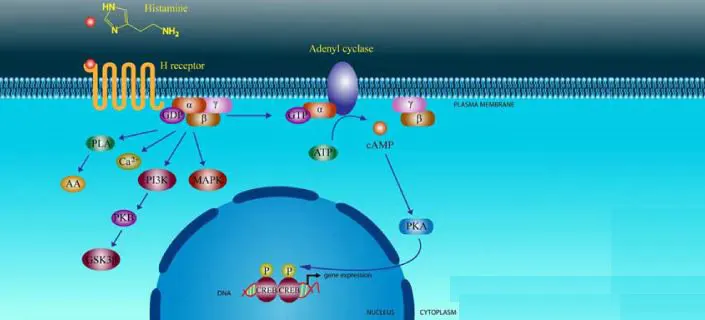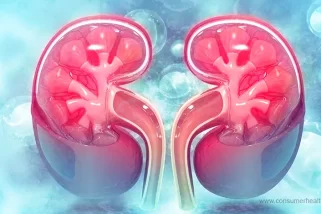In This Article
Histamine is a type of chemical that is found within the human body. It is normally produced as a reaction to a substance.

If someone is allergic to a food or plant, their body releases histamine and inflammation develop. Other symptoms like water retention can develop during the allergic reaction.
What is Histamine?
In the normal human body, water is found in the cells and bloodstream.
The blood is used to transport nutrients and oxygen throughout the body. Once the nutrients arrive, they are used by the tissue for energy. Throughout the process, hormones or prostaglandins help the fluid to remain at the right body.
The kidneys also play a role by excreting excess fluid within the urine. If there is not enough fluid, the body will retain water in order to keep a constant level of fluid.
Histamine is released by the body whenever there is inflammation. It makes the gaps between cells to open so the capillaries start to leak.
This is done by the body to allow white blood cells to arrive at the site and cure the infection or inflammation. If the inflammation is ongoing, water retention may become long-term.
What are the Causes of Histamine?
In the human body, histamine is an organic nitrogen compound. It is involved in the body’s immune response to invaders or allergens.
This chemical also works as a neurotransmitter and causes an inflammatory response [1]. Typically, histamine levels increase when someone is around something that they are allergic to.
Common allergens include hay fever, dairy and dust mites. When someone is around the allergen, histamine is created within mast cells and basophils in the surrounding tissue.
Once this occurs, it can cause water retention and allergy symptoms like nasal congestion. There are certain medications that are designed to combat histamines.
Known as anti-histamines, they can help to stymy histamine production within sinuses and nasal passages. Unfortunately, these medications are not particularly effective against water retention symptoms.
What do You do If You Have Histamine Intolerance?
Histamine intolerance is an underdiagnosed disorder. An individual has this problem when their body cannot breakdown histamine correctly.
If one of the two enzymes systems is not effective at breaking it down, the body will have many symptoms that resemble an allergic reaction.
These include itchy skin, hives(urticaria), tissue swelling, water retention, nasal congestion, red eyes, hypotension, chest pain, irregular heart rate, panic attack, and digestive problems.
On occasion, individuals may experience a headache, agitation, and fatigue. In very rare cases, they may lose consciousness for a few seconds.
Typical food allergies have relatively similar effects each time. With histamine intolerance, the effects are cumulative.
Basically, this means that the symptoms worsen when there is more histamine in the body. In order to treat histamine intolerance symptoms, individuals have to change their diet.
They need to eliminate fermented food and other foods that can increase histamine production. Since this list of foods can vary between people, individuals should consult with their doctor to decide on an appropriate diet.
How does Histamine Affect Water Retention Problems?
Whenever histamine is produced by the body, it causes fluid to leak into the tissues. This is intended to get rid of any harmful substances. In most people, it results in fluid retention.
As long as the allergen is temporary, the swelling and inflammation should leave. If the allergen remains in the environment for longer, water retention will become an ongoing problem.
When the problem is allowed to continue, it will gradually become worse over time.
When these issues are combined with heart or kidney problems, it can make fluid retention worse[2].
Heart problems can cause blood pressure to fall. If the blood pressure is weak, fluid can back up and fill the body’s tissue. Kidneys can also be incapable of removing fluid if they have an infection or inflammation.
What are the Treatment Options Available?
The best way to deal with the problem is to figure out what the allergen is. Once this is done, the allergen should be removed from the diet or the surrounding environment.
If this is not possible, taking anti-histamine medication can help slightly. It will remove some of the water retention symptoms of the allergy, but may not completely treat the water retention.
Supplements For Water Retention
Anti-histamine tablets are intended to treat sinus problems and headaches. They may not be effective against water retention.
To treat fluid retention, individuals may want to use water pills or herbal supplements. An herbal pill or tea can help to reduce water retention and help ease an allergic reaction.
Unlike many medical conditions, individuals cannot stop their body from producing histamine. Allergies are decided based off of the individual’s genetics.
Once an allergen is recognized, individuals can cure their water retention by taking medication or avoiding the allergen. Dietary adjustments can also help to lower the amount of histamine in the body.
2 Sources
We review published medical research in respected scientific journals to arrive at our conclusions about a product or health topic. This ensures the highest standard of scientific accuracy.
[2] What to know about water retention: https://www.medicalnewstoday.com/articles/187978.php








 This article changed my life!
This article changed my life! This article was informative.
This article was informative. I have a medical question.
I have a medical question.
 This article contains incorrect information.
This article contains incorrect information. This article doesn’t have the information I’m looking for.
This article doesn’t have the information I’m looking for.